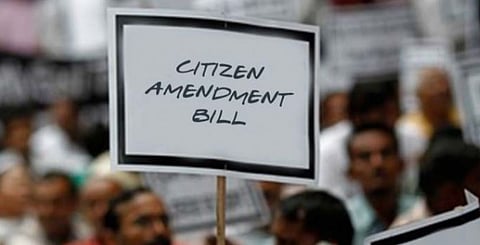
- Home
- Live Blog
- Breaking News
- Top Headlines
- Cities
- NE News
- Sentinel Media
- Sports
- Education
- Jobs

NEW DELHI: The redrafted Citizenship Amendment Bill is likely to exclude three States in the North-East out of its ambit besides the tribal areas in as many as three other the Northeast States.
This comes in the wake of Union Home Minister and BJP president Amit Shah meeting in Delhi with nine representatives from four organisations who are strongly against the Bill.
Three north-eastern States — Arunachal, Nagaland and Mizoram — where the Inner Line Permit (ILP) regime is applicable will be out of the purview of the CAB that created a political row in the area in the run-up to the 2019 general election.
The ILP is an official travel document issued by the Government of India to allow inward travel of an Indian citizen into a protected area for a limited period. The ILP regime is under the Bengal Eastern Frontier Regulation, 1873. Section 2 of the regulation says the ILP system is present in Arunachal, Mizoram and Nagaland. Before the 2019 general election, several organizations in Assam and Mizoram hit the streets claiming the proposed Bill would “open the floodgates” of people from neighbouring countries, altering the unique ethnic and demographic nature of the area.
The politically sensitive Bill, that has already ruffled the feathers of the Opposition, will leave out the tribal areas of Assam, Meghalaya and Tripura as well, sources said. These are the tribal areas where autonomous councils and districts were created under the Sixth Schedule of the Constitution.
These areas enjoy certain legislative powers. The draft of the Bill reads: “Nothing in this section shall apply to tribal areas of Assam, Meghalaya, Mizoram and Tripura as included in the Sixth Schedule of the Constitution and the area covered under ‘The Inner Line’ notified under the Bengal Eastern Frontier Regulation, 1873.” Mizoram falls under the ILP.
However, the draft is silent about the fate of Sikkim. The non-tribal areas of Assam, Meghalaya and Tripura will fall within the ambit of the Bill.
Though the Bill in its present form seeks to allay much of tribals’ concerns in North East, it may also strike a discordant note by keeping away the other three States.
Hours before the Cabinet gave its nod to the redrafted Bill, Shah met at least nine representatives from four organisations who were vehemently against the Bill. Shah is believed to have comforted them with an assurance that the unique identity of North East will not be altered in exchange for a promise that the groups will not protest the amended Bill.
The four organisations that met Shah were the ‘Manipur People Against Citizenship Amendment Bill’ (MANPAC), the ‘Zeliangrong Union’ (Assam, Manipur, Nagaland unit), ‘The North East Forum for Indigenous People’ (NEFIP) and the Imphal unit of ‘Kuki Inpi Manipur’ (KIM). Apart from Shah, Chief Ministers from three north-eastern States — Assam, Manipur and Nagaland — were also present in the meeting in New Delhi, on late Tuesday night.
The Government has now informed its Business Advisory Council (BAC), the contentious Bill will be debated next Tuesday. It aims to amend a 1955 law to grant citizenship to persecuted Hindus, Buddhists, Sikhs, Jains, Parsis and Christians from the Muslim-dominated countries such as Bangladesh, Pakistan and Afghanistan if they have lived In India for six years. (IANS)